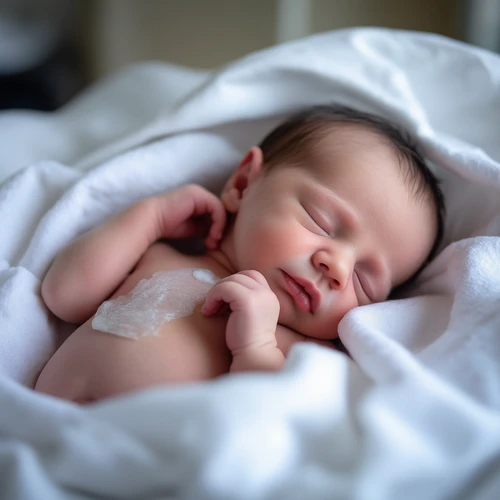Immediate Post-Procedure Care:
The immediate post-surgery period begins as soon as your infant returns from the operating room.- The penis is typically covered with gauze, which may be secured with petroleum jelly or an antibiotic ointment. This helps promote healing and prevents bleeding.
Your healthcare provider will give you detailed instructions on caring for this immediately after you bring your baby home. Follow their advice closely to prevent infection and ensure proper recovery:
- Inspect the area daily for any signs of infection, such as redness, swelling, discharge, or unusual odor.
- Clean the site gently with warm water and a soft washcloth. Avoid using soap, which can be irritating to the delicate skin
- Apply a thin layer of petroleum jelly before putting on a new diaper. This prevents the diaper from sticking to the wound.
Pain Management:
- Your pediatrician may prescribe a pain reliever to help manage your baby's discomfort following circumcision. Always administer any medication as advised by your healthcare provider.
- Acetaminophen or ibuprofen, which can be used as directed based on the baby's age and weight, may also provide some relief..
- For soothing without drugs, gently applying a warm compress to the area can help ease discomfort. Wrapping your infant in a soft, comforting blanket while cradling them near your chest can also provide additional reassurance.
Potential Complications:
Circumcision is generally safe when performed by trained medical professionals; however, as with any surgical procedure, there are potential complications that parents should be aware of. Early detection and prompt treatment of these conditions typically resolve issues effectively.- Infection: While rare, signs include redness, swelling, fever, or unusual discharge from the wound.
- Bleeding: Mild bleeding can occur during healing. However, contact your doctor if you notice persistent or heavy bleeding that doesn’t subside within a few minutes of applying gentle pressure.
- Meatitis: This is an inflammation of the opening of the urethra that may be mistaken for infection due to similar outward symptoms. Usually responsive to simple treatments like warm compresses and gentle cleaning.
When To Seek Help:
Most circumcision wounds heal within just a few weeks, but complications can sometimes arise even after that period.- Fever above 100.4°F (38°C)
- Persistent redness or swelling
- Yellowish or greenish discharge from the wound
- Unusual odor from the area
- If your baby seems excessively fussy or shows signs of severe discomfort, this could indicate pain is not adequately managed.
Long-Term Aftercare:
Once the initial healing process is complete, there are only minor adjustments to the everyday grooming and hygiene routines for a circumcised baby. Regular cleaning, preferably with mild soap and warm water daily during bath time, can keep the area free from bacterial buildup. For boys who have recently begun walking or exploring on their own, encourage pulling down pants before using the bathroom to help maintain good habits regarding personal hygiene as early as possible. In conclusion, careful monitoring of your newborn's circumcision wound is essential in the days following the procedure. With proper aftercare and vigilance for any signs of complications, you can ensure a smooth recovery process for your infant. Always follow the guidance provided by your pediatrician or healthcare professional to best support your baby’s healing. ---

